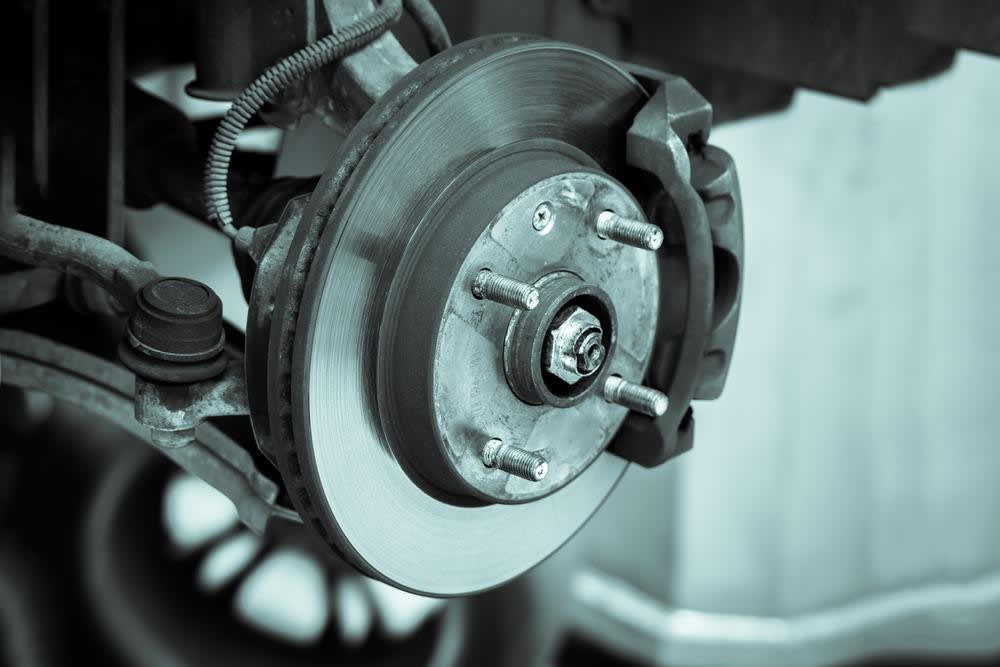

Wheel studs are designed to keep your tire/wheel combination safely secured to your car, truck or SUV. Most people never assume that these hard steel components can go bad or wear out and in most cases, they would be correct. The most common cause of a bad or failing wheel stud is due to improper installation by tire service technicians, over torquing of lug nuts, or lug nuts that are not tight enough. However, because the wheel stud is often exposed to the elements, and takes a tremendous amount of abuse daily, there are other issues that can cause these parts to wear out or break.
Most cars, trucks, and SUVs sold in the United States are equipped with four to six wheel studs on each hub. The wheels are inserted onto the hub and are attached with lug nuts or screw-in wheel studs to safely attach the wheels to the vehicle. They are supposed to be tightened to a precise recommended torque pressure by a certified mechanic. When a stud goes bad, it snaps off the hub and creates a serious safety situation.
There are many warning signs that you should be aware of that will reduce the potential of a broken wheel stud and will keep you safe as you drive down the road. Listed below are a few symptoms or warning signs that will indicate that the wheel studs should be replaced.
Damaged threads on the wheel stud
Tires and wheels are attached to the vehicle by lug nuts that have a similar thread pattern as the wheel studs. Occasionally the threads of the wheel studs can be damaged due to multiple reasons including:
- Improper installation of the wheel's lug nuts onto the stud: the lug nuts are supposed to be hand-threaded a minimum of four rotations to ensure they are properly attached to the wheel studs. Many mechanics and car owners that change a tire on the side of the road often forget this fact before they start to quickly tighten the lug nuts. They should also be tightened in a star pattern and securely fastened to the vehicle’s hub before being placed back on the ground.
- Cross threading the lug nut onto the stud: this happens frequently in several oil service or tire service shops, especially when technicians get in a hurry or use impact wrenches that are set too high. To avoid a cross threading situation, make sure the lug nuts are installed correctly and slowly guide the lug nut onto the wheel stud until it touches the hub. The wheel stud hitting against curbs, potholes or other objects: many of today's cars, trucks and SUV's have protective "hub caps" or wheel covers that protect the wheel stud from impact. However, they don't have to be hit directly in order to be damaged. Sometimes the impact will bend the wheel stud.
- When the wheel stud shows signs of damage, it should be replaced immediately in order to reduce the potential of shearing off the hub while the vehicle is in motion. If you notice that your wheel studs are damaged or if a tire center or service mechanic tells you they are damaged, make sure to have them replaced as soon as possible and that they are properly torqued to the vehicle manufacturer’s recommended pressure.
Rust on the wheel stud
This situation commonly occurs in areas where the car, truck, or SUV is exposed to salt water or sodium chloride used to melt ice on roads in winter. Although many wheel studs are made from stainless steel and are highly resistant to rust, it happens more often than you'd think. When the wheel stud rusts, it becomes very difficult to remove lug nuts or properly place them on the wheel studs without damage occurring as listed above.
It's recommended that if you live in areas where the vehicle is exposed to salt frequently, have your wheel studs examined for signs of rust once per year. If you have rusted studs, have them replaced by a certified mechanic.
In many cases, the damage will be done by careless mechanics who believe they are professional pit crew members of a NASCAR team and treat your wheel studs with the same abuse as these professional racers. However, professional NASCAR teams replace their wheel studs after every single race. If a problem is recognized, don't argue with the mechanic who completed the tire service and may have damaged the wheel stud about who is going to pay for the replacement, contact an independent ASE certified mechanic to do the job correctly.



